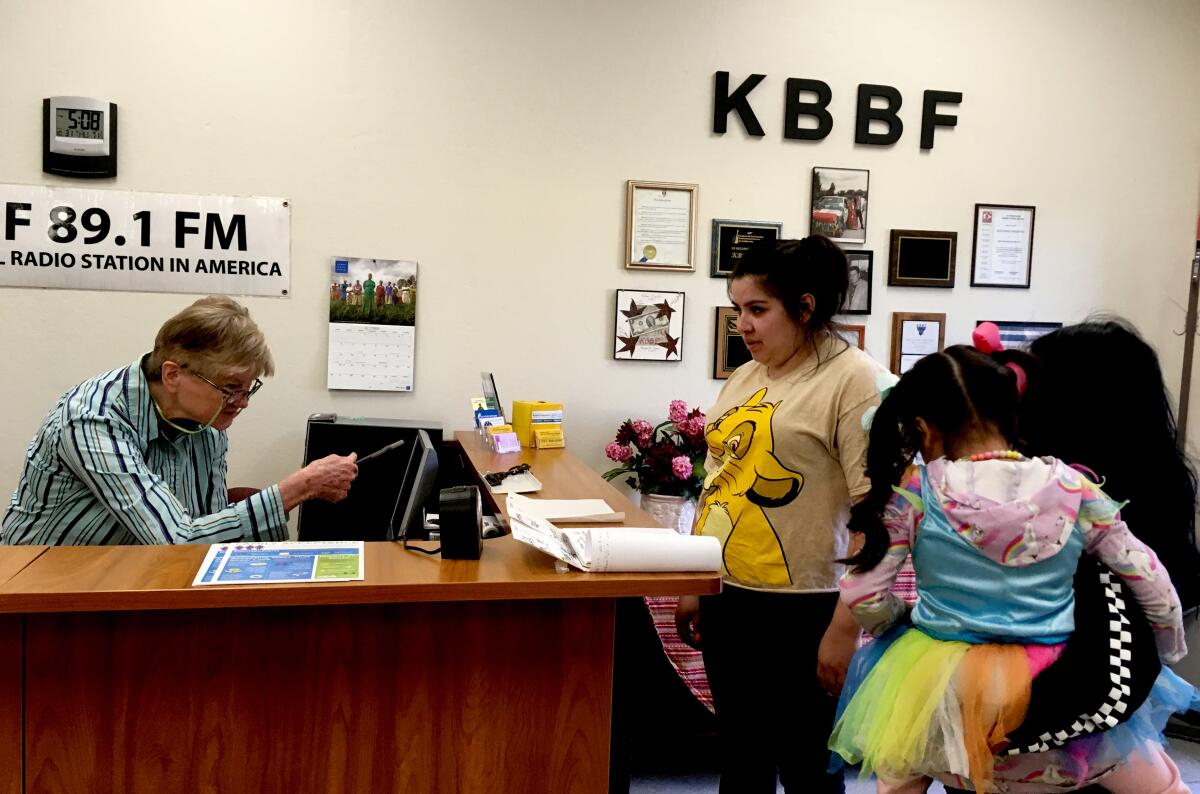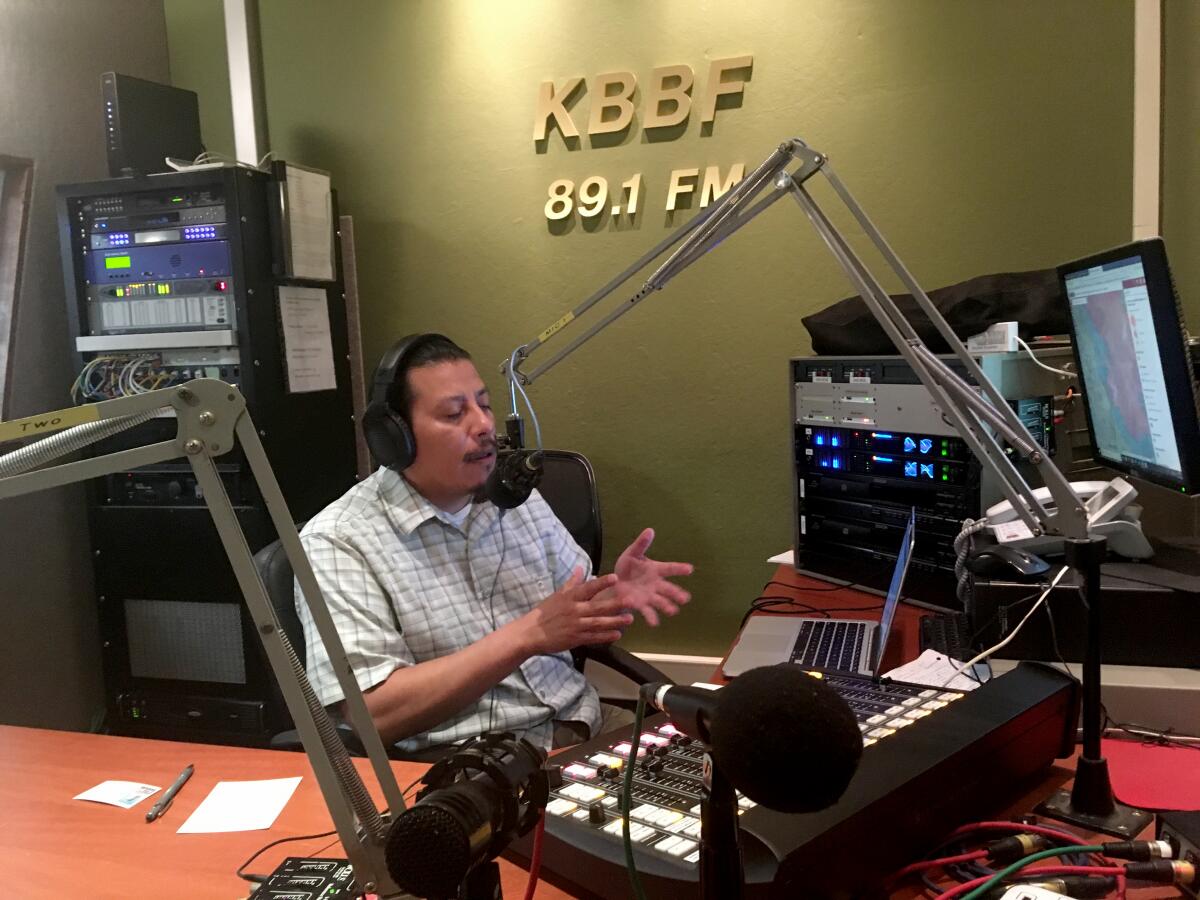As the Kincade fire raged on, a Cesar Chavez-inspired public affairs radio station kept farmworkers informed

- Share via
SANTA ROSA, Calif. — The farmworkers who called Francisco Pardo the morning after the Kincade fire began were more anxious than usual. Some hadn’t slept in case they needed to evacuate. Others said they could not prepare meals because they had lost power.
From the studio at KBBF-FM, a multilingual public affairs radio station in Santa Rosa, Pardo was trying to keep listeners informed of the fire’s danger. As it had done during the devastating 2017 Tubbs fire, the all-volunteer staff had begun a marathon of live coverage.
But taking these calls was important and went to the heart of the station’s original mission. It was formed in the early 1970s during the Chicano movement by students who wanted to empower Northern California farmworkers and migrant families.
“Speaking helps them with the stress,” said Pardo, who spent years working on a Sonoma County vineyard. “They simply want someone to answer the call and to listen.”
The 77,000-acre Kincade fire, which was more than 70% contained by Saturday, forced nearly 200,000 people from their homes late last month. Widespread evacuation orders left masses scrambling for shelter in churches, fairgrounds, friends’ houses and hotels, often finding that places were already full.
In a county with a large Latino population, the station aired critical information to Spanish-speaking listeners who tuned in for updates on evacuations, shelters and power outages. Broadcasts were also made in indigenous languages such as Mixtec and Triqui.
Maria Rojas, 44, from the Mexican state of Michoacan, said her family had been planning to return to their home in Santa Rosa last week when she heard the station say that evacuation orders hadn’t yet been lifted.
“They were telling people what was happening,” she said, standing outside an evacuation center in Santa Rosa on Friday with several bags of diapers and socks for her three children.
The station, located off a residential street a few doors down from a United Farm Workers office, has more than 60 volunteers and dubs itself the first bilingual public radio station in the United States. A poster of Cesar Chavez hangs on one wall while a memorial candle for Andy Lopez, a Santa Rosa boy who was fatally shot in 2013 by a sheriff’s deputy in an incident that generated countywide protests, sits by the entrance.
It was formed by a group of Chicano movement activists from Sonoma State University and Santa Rosa Junior College who wanted to give migrant families an opportunity to express themselves.
“There was no public voice for the Mexican American community,” said Ron Lopez, chair of Chicano and Latino Studies at Sonoma State University, who has also been on the station’s board. “The impact the radio station had was tremendous… If there was a strike action, if there were things going on in the community that were a concern, they could be brought out.”
Javier Guzman, 70, a founding member and child of farmworkers, said the station helped activists rally around issues such as poor wages and living conditions. At one point, they utilized it to coordinate a strike at a movie theater in Healdsburg that had cordoned off a separate section for Mexicans. Its members also helped create a medical clinic for farmworker families.
“The radio station was a way to get the issues out to the community,” he said. “A lot of farmworkers were living in tents, in barns, in really deplorable conditions, and we felt that had to change.”

Rafael Vazquez, a volunteer and professor at Santa Rosa Junior College, arrived at KBBF the night the fire broke out and began announcing where evacuees could seek shelter. At about 1 a.m., he and the station’s programming director brought Sonoma County Supervisor James Gore on-air; his district includes the cities of Cloverdale, Windsor, Healdsberg and parts of Santa Rosa, all affected by the fire.
Vazquez wanted the supervisor to say that there would be consequences for county employees who asked evacuees seeking services about their legal status. In 2017, he recalled, families in the U.S. illegally had avoided shelters out of fear.
“I got him to say it in English and I got him to say it in his broken Spanish,” he said. “I think that as a result, a number of people, instead of sleeping in their cars, instead of staying in other places, they were able to go to shelters.”
Over the course of the week, volunteers at the station took turns working two-hour shifts around the clock. When he wasn’t on-air , Vazquez was updating social media pages with fire information and searching for content he could pass to the hosts who were broadcasting.
“It was insane,” he said. “You know you are tired, you know you are semi-mumbling on the radio, but you know a lot of people are depending on the service.”
A key element, said Edgar Avila, 33, the station’s director of programming, was bringing in officials available to speak to the station — something he said was lacking in 2017. Barry Dugan, a spokesman for the Sonoma County‘s Emergency Operations Center, said that his office had made an effort to increase its bilingual staff.
“Making sure we’re communicating with the Spanish-speaking community is one of the outcomes of the 2017 fires,” he said. “That was one of the messages that we heard.”
Besides informing the public, the station also became an impromptu hub for food donations. Joanna Shapanus, 72, an early volunteer who once spent her summers picketing at vineyards with Cesar Chavez, spent the week of the fire pushing her pink walker around the office to attend to the stream of people who arrived asking for food.
“The majority were campesinos,” she said, using the Spanish term for farmworkers. “They want help and they know this is the place to come for help.”
She also witnessed acts of kindness. The owner of a food cart donated four dozen tamales for the station’s volunteers. One afternoon, Redwood Empire Food Bank served hundreds of people in the station’s parking lot.
The evacuations had serious financial consequences for wine country farmworkers, currently in peak harvest season. Susy Valle, who coordinates the United Farm Workers’ contracts with companies in Sonoma and Napa counties, said at least 500 workers in Sonoma County missed three days of work during the fire. That meant a loss that could range from $500 to $1,000.
“It’s going to be a significant financial hit,” she said.
Ariel Kelley, chief executive of Corazon Healdsburg, a bilingual family resource center that mostly serves farmworker families, said the nonprofit had conducted intakes with over 5,000 families and had distributed a little more than $65,000 in aid.
She said in the aftermath of the fire, those families often don’t have the means to drive to a relief center to get help or might choose to go to work instead.
“They are low-wage workers who are living paycheck to paycheck,” she said. “Typically, resources, whether it’s workforce development or financial development post-disaster, tend to not reach rural communities.”
But for many, the radio station was an accessible and therefore invaluable resource. On Thursday, cousins Marilu Hernandez, 30, and Rosa Garcia, 22, walked into the station’s office to seek food. After evacuating from Windsor, they had stayed in hotels until they could no longer afford to do so, finally moving in with a relative who was hosting about two dozen people.
Garcia, who has a 2-year-old daughter, said she was told that the retirement home she works at in Santa Rosa would be closed for another few weeks.
“That’s three weeks of no working, no money,” she said. “It’s really hard. We’re lucky we have places like this.”
More to Read
Sign up for Essential California
The most important California stories and recommendations in your inbox every morning.
You may occasionally receive promotional content from the Los Angeles Times.














